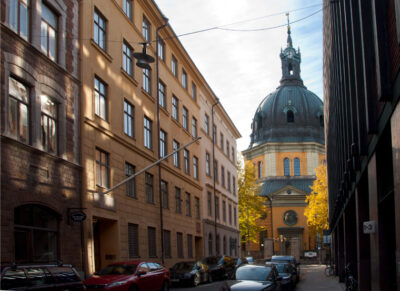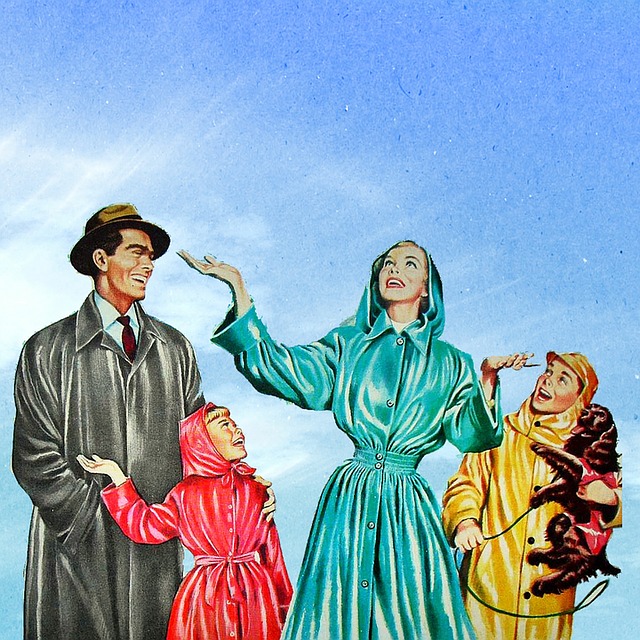
I walked briskly along Jungfrugatan with the manuscripts in a light leather bag, which I found to be very elegant and with just the right patina. The gate revealed itself to me, sometimes it was difficult to find the strange door, but not this time. The late summer winds had hastily taken hold of the city, bringing much-needed coolness and peace. I ignored the elevator and instead rushed up the stairs to the Count’s floor, knocking with three authoritative knocks.
The door was swiftly opened by a young man in a suit. His hair was slicked back and he had a headset on his head. Inside the room, dozens of other people in the same outfit sat talking on the phone. It looked like an typical posh office landscape for financial puppies in the making. Surprised, the guy looked at me, wondering if he could help with something. Just as I was about to inform him that I had accidentally come to the wrong floor, I saw the familiar herringbone-patterned floor and stuccoed ceiling. It was the right place, but the Count and all his strange furniture and possessions were clinically cleaned out.
– I’m looking for the previous owner, I muttered.
– Unfortunately, I have no idea who was here before us, he replied cheerfully, giving me a completely blank stare.
I thanked him and watched the door close just as quickly.
Soon I found myself sitting on the doorstep outside the house. I opened my little metal box of cigarillos. I rarely smoked, but this was a good opportunity. I began sorting notes and finished scripts from the bag, mostly as a knee-jerk reaction, until I could come up with a better strategy. I picked up my phone and logged into the on-line bank, and was surprised by the generous sum that greeted me. Someone had transferred half a million Swedish Crowns into my account. It was more than we had agreed, but I was of course happy with the compensation, although not as thrilled with the prank the Count had played on me. Where had he gone? I had really been looking forward to our conversation.
During our last meeting, the Count had talked about the upcoming confluence. He said the world was on the brink of great change and that it was a historical crossroads that would be well remembered by the writers of the future. The world faced such rapid changes at regular intervals, and anyone who could interpret the signs was obviously able to predict when it would happen. The Count knew, of course, he knew most things; to talk to him was comparable to talking to an explosive Prussian academic of the old school. There were no such people any more. He could cheerfully mix what we call facts, statistics with myths and mysteries. There were no boundaries in conversation; his theses and theories were always rigorous and coherent, if at times far outside the generally accepted.
Humanity would be plagued by decadence, lies and madness, he predicted. And those who kept their wits about them would be hunted down, humiliated and silenced. He predicted huge rifts that cut through classes, families and all social structures. Unrest, conflict and civil war were also on the map; the future looked bleak, but something good would come out of it all, the Count was convinced.
Our cooperation had been as follows. I was invited to a number of sessions, where he controlled the agenda entirely. I didn’t know from time to time what was going to be discussed. My job was to take notes carefully and then send the Count the transcribed documents. At the end of each meeting, we briefly discussed the previous transcripts, and he rarely had anything to comment on. I didn’t quite understand why he had hired me to be his scribe. The old man had the eyes of a raven, and was extremely nimble with his pen. Perhaps he liked the environment where he was allowed to tell, perhaps it was easier for him to remember when he talked and someone listened, and sometimes asked supplementary questions?
Anyway, all the transcribed notes were sent to him, and I had also been asked to make two copies, one of which was sent to a lawyer and the other I kept for myself. Archibald Iratus’ written thoughts were in safe custody, and I suppose this was his way of telling me that it was over, and that he had moved on to some other project, in some other part of the world.
During the last conversation, the Count had also mentioned that a deity would appear on Earth. It would rise from the ruins of the Temple of Zeus at Selinous in Sicily, which in ancient times was part of Magna Greaca, one of the most magnificent regions of the Hellenic world. He often told us that we understood nothing about the ancient Greeks, that they were completely alien to us both culturally and ethnically. That the IQ ratio averaged over 140 in ancient Athens, as proven by estimating the number of inhabitants against the number of geniuses and gifted men in a given time. The result was remarkable.
One of the greatest achievements of the ancient world was the construction of astrolabes, a kind of astronomical measuring instrument or clock. And there was a specific astrolabe from Alexandria, lost in the mists of history, that could calculate the coming confluences. If the mechanism still existed, it would be a veritable gold mine for those who wanted to learn the esoteric sciences, but also for those who were looking for guidance in a difficult and dark time. And Iratus sometimes sounded convinced that the two-thousand-year-old astrolabe really did exist and was in safe keeping somewhere in the world, unclear where.
*
Photo: i99pema, CC BY-SA 3.0 <https://creativecommons.org/licenses/by-sa/3.0>, via Wikimedia Commons
The West already died in the trenches of the First World War







